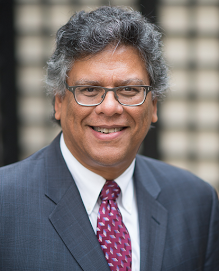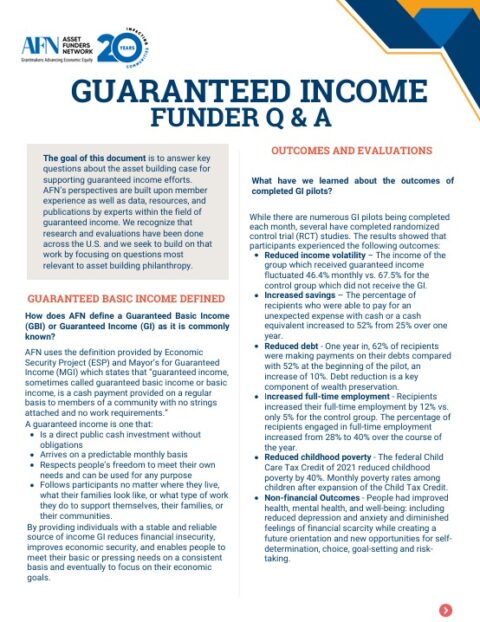FROM THE DIRECTOR
AUGUST 2020
As we all know, philanthropy literally means to promote the welfare of others. There are many approaches taken by our members, but it is strategic and designed to effect change. That element distinguishes it from charity that has the sole purpose to address immediate needs of food, shelter, and emergency needs. At times like the present, philanthropy and charity can temporarily merge to respond to the relief needed as a result of COVID-19 or a natural disaster. But the essence of philanthropy is to be strategic, to identify the root causes of systemic issues underlying societal ills.
With the asset building lens in our unequal economy, the approaches tested and taken have a high purpose to increase opportunity or advance racial and/or gender equity and a practical purpose – to increase economic stability, well-being across many dimensions including health, education, and/or wealth.
Fundamentally, philanthropic asset building is about building reimagined systems that foster economic security and maximize one’s potential while reducing, if not eliminating, the exploitive and extractive tendencies of unfettered institutions. It is about realizing that frameworks exist to allow us to change the predictive nature of race or zip code and to elevate the social determinants to foster greater shared prosperity. There are indeed many paths to improve health and economic well-being that strengthens our communities and systems.
Many systems that destabilize or constrain prosperity for the benefit of the very few are private – and many are a hybrid public-private system that preserves legacies and effects of the past – from redlining racial discrimination, to gender based discrimination, to education funding systems destined to ensure children of color and of too many essential workers are not well educated. Indeed, work on fees and fines and the criminalization of poverty reveals that too many local, state, and federal laws and regulations may restrain or strip wealth.
AFN members continue to use their philanthropy to incent desired change and results across several areas with explicit design to foster corrections to the sins of racism, sexism and oligarchic economic impulses. For the thrust of these reimagined systems to effectively foster racial, ethnic and gender equity, philanthropy understands that the institutions need to engage in uncomfortable discussion that challenge race neutral and ahistorical narratives and results to reveal the bias and inequities woven throughout that need fixing and often fundamental reinvention.
Philanthropy also understands that given the public role in creating or preserving inequity, civic engagement and participation needs to be fostered and supported because systems respond to public pressure. There are also efforts that understand our nation needs a narrative change, that is neither wishful thinking in myths that do not ring true when viewed through an equity lens nor are grounded in fear. In the end, systemic change can only occur if we remind ourselves that investments needs to be not only in system change but also in accountability as change is implemented. Laws need to be enforced to hold predators accountable; legacies of racism that continue to crop up such as in house appraisals or loan availability need to be challenged with consequences; and public decision making has to continue to be challenged until the decisions are clearly equitable. Only by focusing on the future opportunities and getting them done well can we reflect an equitable sense of possibility and inclusion now and for future generations. To do less is to fail in the purpose of philanthropy.
AFN members are committed to bending the arc toward economic justice that is inclusive and equitable. Join us to make this a realty for many more workers and the future generations.



